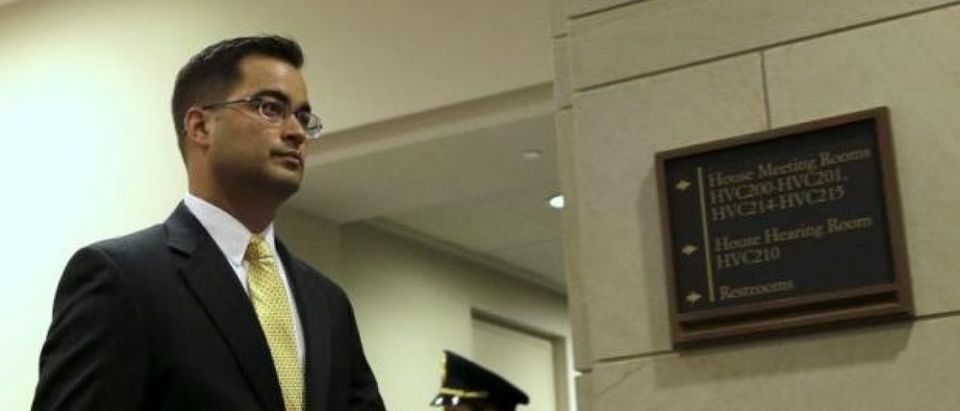The Daily Caller has discovered video showing Hillary Clinton’s private email server technician, Bryan Pagliano, acknowledging that allowing government employees to use their own mobile devices to conduct federal work could conflict with the retention of public records.
The video, which was recorded in Oct. 2013, months after Pagliano left the State Department, also shows Clinton’s IT guru joking about the security implications of so-called “bring your own device” strategies, known as BYOD.
Pagliano’s comments, which were made during a debate about the risks and rewards of BYOD, are ironic given that the off-the-books email system he created for Clinton — which included an email server, Clinton’s personal email domain, and her personal Blackberry device — allowed her to thwart public records requests. It also posed unknown security risks.
Pagliano is currently in the news after it was reported that the FBI granted him immunity in exchange for his cooperation into the investigation of whether classified information was mishandled on Clinton’s private server.
During the debate, Pagliano’s opponent was Jeffrey Vining, who was then his colleague at Gartner, a global IT firm he joined after leaving the State Department.
Vining argued that BYOD — which allows a government worker to use one personal device for both personal and work-related business — could potentially become infected with malware that can “wreck your phone” and “steal your data.”
“So [Vining] wants you to carry two devices around,” Pagliano responded in a critical but joking manner. “Like we’re on Noah’s Ark or something like that.”
BYOD is a strategy that Pagliano, who no longer works at Gartner, supported while he worked at the State Department and one that Clinton effectively used while in office.
WATCH:
The former secretary of state mostly sent and received work-related emails on her personal Blackberry. In defending the decision to do that, the Democratic presidential candidate has said she did so out of “convenience.” That despite an email from Aug. 2011 showing that when the State Department’s executive secretariat proposed providing Clinton a government-issued Blackberry equipped with a state.gov email address, Clinton’s longtime aide Huma Abedin rejected the idea.
Clinton, who occasionally emailed from an iPad, had been provided an account on the the State Department’s classified messaging system, but she never used it.
Clinton has maintained that her use of a personal email account “was allowed” by the State Department. However, she violated agency policy by failing to turn over her work-related emails for nearly two years after leaving State. She also violated the spirit of federal regulations, which allow government workers to use personal email account for government business only as a last resort.
Clinton’s home-brew system, which she paid Pagliano out of her own funds to set up and manage, also allowed her to avoid having her work emails made public through records requests. Multiple Freedom of Information Act requests for Clinton’s emails were improperly denied during her tenure.
Ironically, Pagliano touched on BYOD’s implications for records requests during his debate.
“A lot of us are under regulatory policies because we’re government. Does a BYOD strategy conflict with any sort of records act retention that we have to deal with?” Pagliano asked rhetorically.
“You also have to get buy-in from the lawyers,” he added.
WATCH:
The State Department’s attorneys are currently busy at work. After Clinton’s personal email and server use was exposed last year, dozens of lawsuits have been filed seeking agency records.
In making the case against BYOD strategies, Vining, Pagliano’s counterpart, pointed to security and compliance risks associated with allowing employees to use their own mobile devices.
Referring to former National Security Agency analyst Edward Snowden’s hack of classified government records, Vining said that government IT officials scrambled to protect against “accidental data leaks or compliance problems.”
“They certainly didn’t want to leak data from a ‘Top Secret’ to a ‘Secret’ as well,” he said.
That mention is also ironic given that more than 2,000 classified emails have been found on Clinton’s server. Of those, at least 22 have been found to contain “Top Secret” information. That’s in addition to more than 60 “Secret” emails. FBI investigators are reportedly investigating whether Clinton’s aides copied information from classified systems into their unclassified email accounts before forwarding the messages to Clinton’s personal account.
But Pagliano defended against Vining’s assertion that BYOD strategies pose unmanageable leakage risks.
“Preventing leakage coming from these devices is a near impossible task if you simply focus on the device,” he said. “You have to focus on the data and you have to focus on…what the data’s being used for and who’s using the data.”
In his opening statements during his debate with Vining, Pagliano, also appeared to refer to a “don’t ask, don’t tell” policy regarding government employees’ usage of personal devices.
“‘Don’t ask, don’t tell’ is no longer a suitable strategy for BYOD,” he said.
And in another ironic moment during the debate, Vining referred to the fact that “personal emails” are often found “on government servers.”
Pagliano took the floor immediately after those comments but — not surprisingly — did not acknowledge that he had set up a non-governmental server for Clinton.
Former RAWSTORY Executive Editor Ron Brynaert — who recently reported for the Daily Caller that another longtime Hillary Clinton aide used a private email address while working at the State Department — provided some research for this article.


